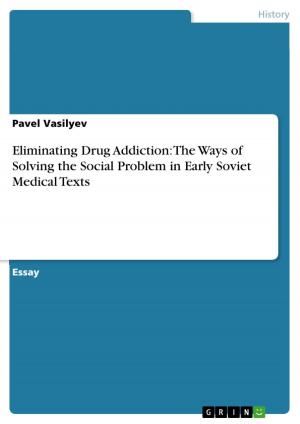You speak German very well - Integration of immigrants in Western countries
Chances for state and society
Nonfiction, Social & Cultural Studies, Political Science, International, International Relations| Author: | Farshad Mohammad-Avvali | ISBN: | 9783638535182 |
| Publisher: | GRIN Publishing | Publication: | August 17, 2006 |
| Imprint: | GRIN Publishing | Language: | English |
| Author: | Farshad Mohammad-Avvali |
| ISBN: | 9783638535182 |
| Publisher: | GRIN Publishing |
| Publication: | August 17, 2006 |
| Imprint: | GRIN Publishing |
| Language: | English |
Essay from the year 2005 in the subject Politics - International Politics - General and Theories, American University of Beirut, course: International Conflicts and Conflict Resolution, 9 entries in the bibliography, language: English, abstract: The incentive for the topic of integration derived from the personal experience of coping with the forces of integration in Germany and the rise of the matter of integration to a salient part of the domestic agenda of Western European states and the US as well as countries like New Zealand and Australia. Whether the author considers himself as a success story of smooth integration into German society shall not be debated here. With stagnant or even declining birth rates in the above mentioned countries, the inevitable presence of considerably high percentages of immigrants and their children and, probably most importantly, with the international program to promote the unity of the human race , Western politicians, 'native' societies and immigrants together must reconsider the principles of integration, national identity and citizenship as indicators of a national community. Surely, this exposes the antagonists of this process to serious challenges and changes. Any idea of blood-and-soil identity cannot be upheld anymore, neither by the host-society nor by any immigrant community, and the legal access to full citizenship must be granted by the state. The transition from 'guest' to 'citizen' is not impossible nor a horribly difficult adventure; it can be achieved with a deliberate and genuine effort and collaboration by all three important parts of society. Thus, this paper argues that there is indeed a 'digestible' form of integration that will rule out the breeding of conflict by availability of positive identification with the host society. On a general note, in all discussions about integration and identity, one should remember the problem of the 'softness' of this phenomenon. A widespread problem for any field of humanities is that we cannot hold our research objects in our hands. By trying to do so, we materialize them in language, spoken or typed, and hence, force it into boundaries that deform its natural state of being in society. The intricate encounters in daily discussions which form public opinion about integration and immigration cannot be handled here. We should just be aware that there are influential forces within society that dominate a certain type of thinking, no matter positive or negative towards integration of immigrants. To filter out which phenomena contribute to which attitude is not the goal of this paper .
Essay from the year 2005 in the subject Politics - International Politics - General and Theories, American University of Beirut, course: International Conflicts and Conflict Resolution, 9 entries in the bibliography, language: English, abstract: The incentive for the topic of integration derived from the personal experience of coping with the forces of integration in Germany and the rise of the matter of integration to a salient part of the domestic agenda of Western European states and the US as well as countries like New Zealand and Australia. Whether the author considers himself as a success story of smooth integration into German society shall not be debated here. With stagnant or even declining birth rates in the above mentioned countries, the inevitable presence of considerably high percentages of immigrants and their children and, probably most importantly, with the international program to promote the unity of the human race , Western politicians, 'native' societies and immigrants together must reconsider the principles of integration, national identity and citizenship as indicators of a national community. Surely, this exposes the antagonists of this process to serious challenges and changes. Any idea of blood-and-soil identity cannot be upheld anymore, neither by the host-society nor by any immigrant community, and the legal access to full citizenship must be granted by the state. The transition from 'guest' to 'citizen' is not impossible nor a horribly difficult adventure; it can be achieved with a deliberate and genuine effort and collaboration by all three important parts of society. Thus, this paper argues that there is indeed a 'digestible' form of integration that will rule out the breeding of conflict by availability of positive identification with the host society. On a general note, in all discussions about integration and identity, one should remember the problem of the 'softness' of this phenomenon. A widespread problem for any field of humanities is that we cannot hold our research objects in our hands. By trying to do so, we materialize them in language, spoken or typed, and hence, force it into boundaries that deform its natural state of being in society. The intricate encounters in daily discussions which form public opinion about integration and immigration cannot be handled here. We should just be aware that there are influential forces within society that dominate a certain type of thinking, no matter positive or negative towards integration of immigrants. To filter out which phenomena contribute to which attitude is not the goal of this paper .















